[English] 日本語
 Yorodumi
Yorodumi- EMDB-6684: Cryo-EM structure of the Catalytic Step II spliceosome (C* comple... -
+ Open data
Open data
- Basic information
Basic information
| Entry | Database: EMDB / ID: EMD-6684 | |||||||||
|---|---|---|---|---|---|---|---|---|---|---|
| Title | Cryo-EM structure of the Catalytic Step II spliceosome (C* complex) at 4.0 angstrom resolution | |||||||||
 Map data Map data | Yeast Step II Catalytically Activated Spliceosome, C* spliceosome | |||||||||
 Sample Sample |
| |||||||||
| Function / homology |  Function and homology information Function and homology informationRNA exon ligation / snRNA metabolic process / snRNA modification / U2-type post-spliceosomal complex / mRNA branch site recognition / U2-type post-mRNA release spliceosomal complex / cellular bud site selection / post-mRNA release spliceosomal complex / 3'-5' RNA helicase activity / generation of catalytic spliceosome for first transesterification step ...RNA exon ligation / snRNA metabolic process / snRNA modification / U2-type post-spliceosomal complex / mRNA branch site recognition / U2-type post-mRNA release spliceosomal complex / cellular bud site selection / post-mRNA release spliceosomal complex / 3'-5' RNA helicase activity / generation of catalytic spliceosome for first transesterification step / cis assembly of pre-catalytic spliceosome / nuclear mRNA surveillance / spliceosome conformational change to release U4 (or U4atac) and U1 (or U11) / U4/U6 snRNP / 7-methylguanosine cap hypermethylation / U2-type catalytic step 1 spliceosome / pre-mRNA binding / pICln-Sm protein complex / ATP-dependent activity, acting on RNA / snRNP binding / small nuclear ribonucleoprotein complex / splicing factor binding / SMN-Sm protein complex / spliceosomal tri-snRNP complex / mRNA cis splicing, via spliceosome / commitment complex / U2-type prespliceosome assembly / U2-type spliceosomal complex / U2-type catalytic step 2 spliceosome / U2 snRNP / U1 snRNP / U4 snRNP / U2-type prespliceosome / poly(U) RNA binding / precatalytic spliceosome / generation of catalytic spliceosome for second transesterification step / Formation of TC-NER Pre-Incision Complex / mRNA 5'-splice site recognition / spliceosomal complex assembly / mRNA 3'-splice site recognition / Gap-filling DNA repair synthesis and ligation in TC-NER / spliceosomal tri-snRNP complex assembly / Prp19 complex / DNA replication origin binding / Dual incision in TC-NER / U5 snRNA binding / U5 snRNP / protein K63-linked ubiquitination / DNA replication initiation / U2 snRNA binding / U6 snRNA binding / pre-mRNA intronic binding / spliceosomal snRNP assembly / U1 snRNA binding / U4/U6 x U5 tri-snRNP complex / catalytic step 2 spliceosome / positive regulation of cell cycle / nuclear periphery / positive regulation of RNA splicing / spliceosomal complex / mRNA splicing, via spliceosome / RING-type E3 ubiquitin transferase / metallopeptidase activity / ubiquitin-protein transferase activity / ubiquitin protein ligase activity / RNA helicase / DNA repair / GTPase activity / mRNA binding / chromatin binding / chromatin / GTP binding / ATP hydrolysis activity / mitochondrion / DNA binding / RNA binding / zinc ion binding / ATP binding / identical protein binding / nucleus / cytoplasm / cytosol Similarity search - Function | |||||||||
| Biological species |  | |||||||||
| Method | single particle reconstruction / cryo EM / Resolution: 4.0 Å | |||||||||
 Authors Authors | Yan C / Wan R / Bai R / Huang G / Shi Y | |||||||||
 Citation Citation |  Journal: Science / Year: 2017 Journal: Science / Year: 2017Title: Structure of a yeast step II catalytically activated spliceosome. Authors: Chuangye Yan / Ruixue Wan / Rui Bai / Gaoxingyu Huang / Yigong Shi /  Abstract: Each cycle of precursor messenger RNA (pre-mRNA) splicing comprises two sequential reactions, first freeing the 5' exon and generating an intron lariat-3' exon and then ligating the two exons and ...Each cycle of precursor messenger RNA (pre-mRNA) splicing comprises two sequential reactions, first freeing the 5' exon and generating an intron lariat-3' exon and then ligating the two exons and releasing the intron lariat. The second reaction is executed by the step II catalytically activated spliceosome (known as the C* complex). Here, we present the cryo-electron microscopy structure of a C* complex from Saccharomyces cerevisiae at an average resolution of 4.0 angstroms. Compared with the preceding spliceosomal complex (C complex), the lariat junction has been translocated by 15 to 20 angstroms to vacate space for the incoming 3'-exon sequences. The step I splicing factors Cwc25 and Yju2 have been dissociated from the active site. Two catalytic motifs from Prp8 (the 1585 loop and the β finger of the ribonuclease H-like domain), along with the step II splicing factors Prp17 and Prp18 and other surrounding proteins, are poised to assist the second transesterification. These structural features, together with those reported for other spliceosomal complexes, yield a near-complete mechanistic picture on the splicing cycle. | |||||||||
| History |
|
- Structure visualization
Structure visualization
| Movie |
 Movie viewer Movie viewer |
|---|---|
| Structure viewer | EM map:  SurfView SurfView Molmil Molmil Jmol/JSmol Jmol/JSmol |
| Supplemental images |
- Downloads & links
Downloads & links
-EMDB archive
| Map data |  emd_6684.map.gz emd_6684.map.gz | 228.9 MB |  EMDB map data format EMDB map data format | |
|---|---|---|---|---|
| Header (meta data) |  emd-6684-v30.xml emd-6684-v30.xml emd-6684.xml emd-6684.xml | 8.4 KB 8.4 KB | Display Display |  EMDB header EMDB header |
| Images |  emd_6684.png emd_6684.png | 195.9 KB | ||
| Archive directory |  http://ftp.pdbj.org/pub/emdb/structures/EMD-6684 http://ftp.pdbj.org/pub/emdb/structures/EMD-6684 ftp://ftp.pdbj.org/pub/emdb/structures/EMD-6684 ftp://ftp.pdbj.org/pub/emdb/structures/EMD-6684 | HTTPS FTP |
-Related structure data
| Related structure data |  5wsgMC M: atomic model generated by this map C: citing same article ( |
|---|---|
| Similar structure data |
- Links
Links
| EMDB pages |  EMDB (EBI/PDBe) / EMDB (EBI/PDBe) /  EMDataResource EMDataResource |
|---|---|
| Related items in Molecule of the Month |
- Map
Map
| File |  Download / File: emd_6684.map.gz / Format: CCP4 / Size: 244.1 MB / Type: IMAGE STORED AS FLOATING POINT NUMBER (4 BYTES) Download / File: emd_6684.map.gz / Format: CCP4 / Size: 244.1 MB / Type: IMAGE STORED AS FLOATING POINT NUMBER (4 BYTES) | ||||||||||||||||||||||||||||||||||||||||||||||||||||||||||||
|---|---|---|---|---|---|---|---|---|---|---|---|---|---|---|---|---|---|---|---|---|---|---|---|---|---|---|---|---|---|---|---|---|---|---|---|---|---|---|---|---|---|---|---|---|---|---|---|---|---|---|---|---|---|---|---|---|---|---|---|---|---|
| Annotation | Yeast Step II Catalytically Activated Spliceosome, C* spliceosome | ||||||||||||||||||||||||||||||||||||||||||||||||||||||||||||
| Projections & slices | Image control
Images are generated by Spider. | ||||||||||||||||||||||||||||||||||||||||||||||||||||||||||||
| Voxel size | X=Y=Z: 1.306 Å | ||||||||||||||||||||||||||||||||||||||||||||||||||||||||||||
| Density |
| ||||||||||||||||||||||||||||||||||||||||||||||||||||||||||||
| Symmetry | Space group: 1 | ||||||||||||||||||||||||||||||||||||||||||||||||||||||||||||
| Details | EMDB XML:
CCP4 map header:
| ||||||||||||||||||||||||||||||||||||||||||||||||||||||||||||
-Supplemental data
- Sample components
Sample components
-Entire : C* spliceosome
| Entire | Name: C* spliceosome |
|---|---|
| Components |
|
-Supramolecule #1: C* spliceosome
| Supramolecule | Name: C* spliceosome / type: complex / ID: 1 / Parent: 0 |
|---|---|
| Source (natural) | Organism:  |
| Molecular weight | Theoretical: 1.5 MDa |
-Experimental details
-Structure determination
| Method | cryo EM |
|---|---|
 Processing Processing | single particle reconstruction |
| Aggregation state | particle |
- Sample preparation
Sample preparation
| Concentration | 0.27 mg/mL |
|---|---|
| Buffer | pH: 8 |
| Vitrification | Cryogen name: ETHANE |
- Electron microscopy
Electron microscopy
| Microscope | FEI TITAN KRIOS |
|---|---|
| Image recording | Film or detector model: GATAN K2 SUMMIT (4k x 4k) / Average electron dose: 1.6 e/Å2 |
| Electron beam | Acceleration voltage: 300 kV / Electron source:  FIELD EMISSION GUN FIELD EMISSION GUN |
| Electron optics | Illumination mode: FLOOD BEAM / Imaging mode: BRIGHT FIELD / Cs: 2.7 mm |
| Sample stage | Cooling holder cryogen: NITROGEN |
| Experimental equipment |  Model: Titan Krios / Image courtesy: FEI Company |
 Movie
Movie Controller
Controller









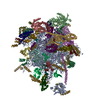

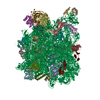
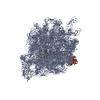

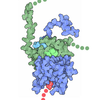

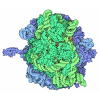

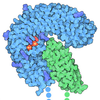


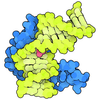


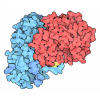
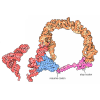
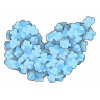


 Z (Sec.)
Z (Sec.) Y (Row.)
Y (Row.) X (Col.)
X (Col.)






















